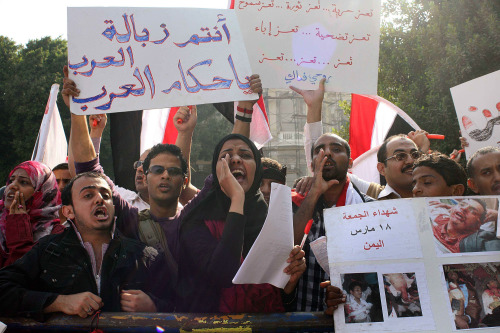Jordan’s king becomes first Arab leader to call for Assad’s descent
DAMASCUS (AFP) ― Jordan’s King Abdullah II urged President Bashar Assad to step down as the Syrian regime stood defiant in the face of growing international pressure and activists said dozens more were killed.
Damascus stood increasingly isolated as the European Union and United States showered praise on the Arab League for its weekend decision to suspend Syria’s membership over its lethal crackdown on protests.
And in the first call by an Arab leader for Assad to quit, King Abdullah said in remarks aired on the BBC: “I believe, if I were in his shoes, I would step down.”
“I would step down and make sure whoever comes behind me has the ability to change the status quo that we’re seeing.”
But Syrian Foreign Minister Walid Muallem told a packed news conference Damascus would not budge despite the “dangerous” and “shameful” Arab League move.
“The decision of the Arab League to suspend Syria represents a dangerous step,” Muallem said.
“Today there is a crisis in Syria which pays the price of its strong positions. Syria will not budge and will emerge stronger ... and plots against Syria will fail.”
 |
Syrian protestors demonstrate against Syria’s President Bashar Assad in Cairo, Egypt on Saturday. (UPI-Yonhap News) |
On the ground, Syrian security forces shot dead at least 16 civilians in the flashpoint southern province of Daraa while 19 regime forces were killed in clashes with suspected army deserters, a rights group said.
The Britain-based Syrian Observatory for Human Rights said the civilians were killed by gunfire from checkpoints manned by security forces in Daraa, the cradle of eight months of anti-regime protests.
Security forces also killed two people in the central city of Homs, it said.
The EU said it “salutes and fully supports” the Arab League’s suspension of Syria for failing to implement a plan to end a violent clampdown on pro-democracy protests that has killed 3,500 since mid-March, according to the United Nations.
It “shows the increasing isolation of the Syrian regime,” the EU said, adding the bloc “stands ready to engage with representative members of the opposition ... such as the Syrian National Council.”
EU foreign policy chief Catherine Ashton said she had been in touch with Arab League chief Nabil al-Arabi on how to protect civilians. “We will keep in touch and see what can be done.”
U.S. State Department spokesman Mark Toner said the United States would “continue to consult not only with the Arab League, but also with the EU and our other partners as we move forward in trying to find ways to increase the pressure on Assad.”
Dismissing U.S. military intervention for now, Toner said the focus was on “trying to increase the economic noose, if you will, around the Assad regime, to choke them off financially so that they feel the effects of this in growing isolation and that they cease the violence.”
He added: “We never take any options off the table, certainly, but, you know, we’re going to try to find ways to increase the political and economic isolation on Syria.”
In new sanctions, EU ministers agreed to stop Syria accessing funds from the European Investment Bank (EIB).
They also blacklisted a further 18 Syrians, mostly members of the military, bringing to 74 the members of Assad’s inner circle hit in past months by an EU assets freeze and travel ban.
In Damascus, Muallem slammed international interference, blaming Washington for “encouraging acts of violence” and said there was a spike in operations by “armed groups” in Syria. He blamed this violence for delays in withdrawing troops from the streets, as the Arab League had demanded.
EU foreign ministers said in a statement the continuing bloodshed called for international action, and “urges all members of the Security Council to assume their responsibilities.”
Swedish Foreign Minister Carl Bildt said the U.N. should explore sending observers or a U.N. humanitarian mission.
The Arab League announced plans to send a 500-strong delegation to Syria, including human rights activists, media and military experts, to assess the situation and study measures to protect civilians.
Arab foreign ministers are due to set a date for the mission on Wednesday, on the sidelines of a meeting in Rabat, according to an official of the Cairo-based Arab League.
The ministers had met on November 2, when they drew up a plan under which Syria would pull troops back from protest hubs and free arrested demonstrators.
That meeting gave Syria 15 days to comply.
On Saturday, the Arab bloc decided that Damascus had failed to keep its side of the bargain and 18 of its 22 members voted in favor of Syria’s suspension, which will come into effect on Wednesday.








